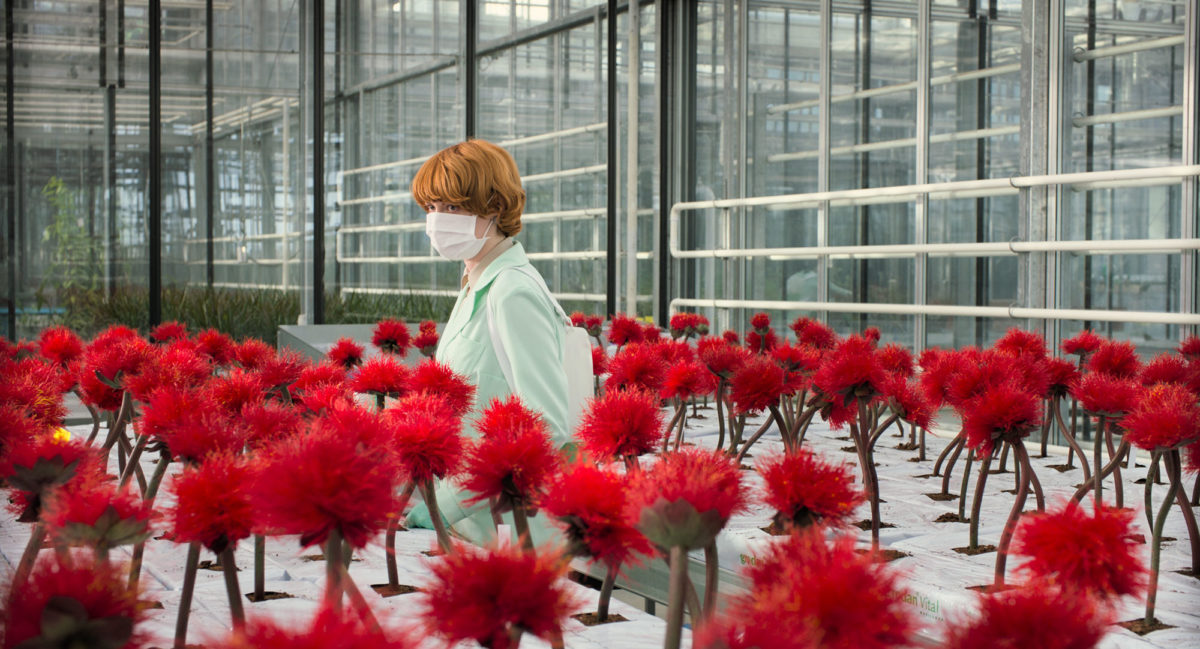While some filmmakers operate within a specific genre throughout their careers, others, such as Jessica Hausner, jump from one to the next. From her first feature, the drama Lovely Rita (2001), to the horror/mystery Hotel (2004) and the period piece Amour Fou (2014), Hausner has done almost everything. As this decade comes to a close, Hausner checks another genre off her list by co-writing and directing the sci-fi Little Joe (2019).
The film introduces its titular ‘character’ with a panoramic view of an artificial garden filled with red and blue flowers, created by Alice (Emily Beecham), mother to Joe (Kit Connor). Displayed in symmetrical rows, this exotic experiment is called ‘Little Joe’, a new plant species whose scent can make you happy in exchange for your time and mind. Growing rapidly and with no complications at first, Little Joe is a promising investment in that its estimated maximum profits can be provided in the shortest amount of time. That is until the secret ingredient of its success comes to light. In the name of science, or realistically speaking, unlimited fame, Alice not only creates sterile plants to prevent their uncontrollable reproduction, but also uses a forbidden r-virus to accelerate the plant’s development, and thus be crowned the pioneering queen.
As artificial nature gradually replaces actual nature in its ability to heal people’s man-made sorrow, so does Hausner’s use of irony point to the general obsession with unnecessary innovation, and a stubborn refusal to find peace in rural landscapes. After all, the only genuinely content character in the film is Alice’s ex-husband, Ivan (Sebastian Hülk), who has kept a distance from the city, and for that reason is deemed “weird”; he is an Other who is “not like us,” as Joe declares to his mother.
It’s Joe’s mother, and her transgressive methods to succeed, however, that lead to destructive ramifications. In true survival of the fittest vein, the flower adapts to its surroundings by assuming control of any nearby humans with the sole purpose to breed. Even if the threat in this case isn’t extra-terrestrial in nature, Hausner is borrowing from Invasion of the Body Snatchers as innocent people become mere shadows of themselves. Instead of holding the plant responsible for the human race’s inevitable demise, however, Hausner focuses on human hubris. As claimed by Alice’s colleague Bella (Kerry Fox), the flower “cannot be held accountable” for its instinctive adjustments to environmental stimuli: “it’s just a plant.”
What should have been the film’s center is nevertheless put on the periphery since the film keeps wavering in its support of this claim. In visual terms, for instance, the plant has a distinctive red color, while everything else is in pastel or dark hues. This stark difference signifies Little Joe’s “special breed” and uniqueness. The color doesn’t strive to suggest distinction alone; it also adds to the plant’s allure. This, along with the fact that the plant is shown voluntarily affecting his victims whenever it spreads its petals, marks it as a predator. So it comes as no surprise that every character, regardless of age or gender, surrenders to the plant’s calling, and offers their allegiance no matter the cost.
The film’s soundtrack abides by horror genre conventions and frames Little Joe as the story’s villain. Loud and unexpected clanging noises accompanying the plant’s appearance hint at its ominous nature and intent to do harm. Intuitively, the audience is guided to perceive the title character as evil. Casting Little Joe as the antagonist, however, presupposes a sense of inherent morality, which, considering that the character is a genetically modified plant, cannot be true. Whether Hausner intentionally creates this dichotomy regarding Little Joe is uncertain. The clash between form and content is nevertheless fairly persistent and not only deprives the film of a resolution, but also leaves the viewer unable to decide on Little Joe’s guilt or innocence. It is Hausner’s vacillation between the good/bad binary in relation to Alice’s unruly innovation that eventually ruins the director’s efforts to successfully experiment with the sci-fi genre.
